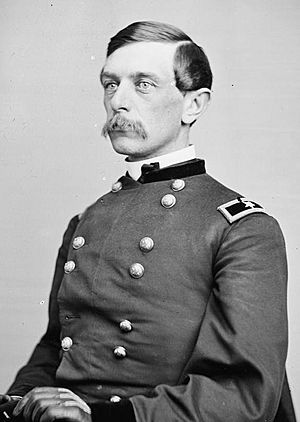James Deering Fessenden facts for kids
Quick facts for kids
James Deering Fessenden
|
|
|---|---|

James D. Fessenden
|
|
| Born | September 28, 1833 Westbrook, Maine |
| Died | November 18, 1882 (aged 49) Portland, Maine |
| Place of burial |
Evergreen Cemetery, Portland, Maine
|
| Allegiance | United States of America Union |
| Service/ |
United States Army Union Army |
| Years of service | 1861–1866 |
| Rank | |
| Commands held | brigade in the XIX Corps |
| Battles/wars | American Civil War |
| Relations | Francis Fessenden (brother) |
James Deering Fessenden (born September 28, 1833 – died November 18, 1882) was an important person from Maine. He was a lawyer, a politician, and a soldier. During the American Civil War, he became a general in the Union Army.
For most of the war, he worked behind the scenes, planning military actions. Later, he led a group of soldiers called an infantry brigade in the western part of the war. In 1862, he helped create one of the first groups of African American soldiers in the Union Army in South Carolina. James Fessenden came from a powerful family, the Fessendens, who were well-known in American politics in the mid-1800s.
Early Life and Education
James D. Fessenden was born in Westbrook, Maine, in the fall of 1833. His father, William P. Fessenden, was a U.S. Senator. James also had a brother, Francis Fessenden, who became a Union general like him. Sadly, another brother, Samuel, died during the war at the Second Battle of Bull Run. Two of his uncles, Samuel C. Fessenden and T. A. D. Fessenden, were also members of the U.S. Congress.
James went to local schools and then graduated from Bowdoin College in 1852. After college, he studied law and passed his exams. He then joined his father's law firm.
Service in the Civil War
When the Civil War began in 1861, James Fessenden spent the summer recruiting and organizing a special company of skilled riflemen. These soldiers became part of the United States Sharpshooters. In November 1861, he became a captain in this sharpshooter company. He served in the defenses around Washington, D.C..
Because his father was a powerful senator, James was promoted to lieutenant colonel. He became a staff officer and aide-de-camp (a personal assistant) to Union Maj. Gen. David Hunter. He held this job from March 1862 to January 1863. During this time, he was promoted to colonel in July 1862. He helped plan attacks against the Confederate defenses in Charleston, South Carolina. He missed the main attacks because he was recovering from a riding accident. While he was recovering, he often gave speeches and helped recruit new soldiers.
In November 1863, Fessenden became an aide to Maj. Gen. Joseph Hooker. Hooker's troops were sent to Tennessee to help the Army of the Cumberland. Hooker praised Fessenden for his bravery at the Battle of Missionary Ridge. He even suggested Fessenden be promoted to brigadier general. Fessenden was also praised three times for his actions during the Atlanta Campaign. Hooker again recommended him for a higher rank.
In August 1864, Fessenden finally became a brigadier general. He was assigned to lead a brigade in the Union Army of the Shenandoah in Virginia. This job was first meant for his brother, Francis, but Francis had lost a leg in another battle. James Fessenden arrived in Virginia and took command of a brigade in the XIX Corps. He fought in the Battle of Cedar Creek in October. After that, he was put in charge of the Union soldiers defending Winchester, Virginia, in January 1865.
In May 1865, after the war ended, he led his brigade in the Grand Review of the Armies in Washington, D.C. This was a large parade celebrating the Union victory. He then commanded troops in South Carolina before leaving the army on January 15, 1866. Before he left, he received an honorary promotion to major general.
Life After the War
After the war, Fessenden went back to Maine. He continued his law career, working with his brother Francis. He also became involved in local and state politics. He was elected to serve three terms in the Maine State Legislature. He also worked for the U.S. government as the Register of Bankruptcy for his area. Later in his life, he helped edit his brother's book about their father, which was published after James had passed away.
He was a member of the Maine Commandery of the Military Order of the Loyal Legion of the United States. This was a special group for officers who served the Union during the Civil War.
James D. Fessenden died in Portland, Maine. He is buried in Evergreen Cemetery.
Family Tree
|
||||||||||||||||||||||||||||||||||||||||||||||||||||||||||||||||||||||||||||||||||||||||||||||||||||||||||||||||||||||||||||||||||||||||||||||||||||||||||||||||||||||||||||||||||||||||||||||||||||||||||||||||||||||||||||||||||||||||||||||||||||||||||||||||||||||||||||||||||||||||||||||||||||||||||||||||||||||||||||||||||||||||||||||||||||||||||||||
| Notes: | ||||||||||||||||||||||||||||||||||||||||||||||||||||||||||||||||||||||||||||||||||||||||||||||||||||||||||||||||||||||||||||||||||||||||||||||||||||||||||||||||||||||||||||||||||||||||||||||||||||||||||||||||||||||||||||||||||||||||||||||||||||||||||||||||||||||||||||||||||||||||||||||||||||||||||||||||||||||||||||||||||||||||||||||||||||||||||||||
 | Delilah Pierce |
 | Gordon Parks |
 | Augusta Savage |
 | Charles Ethan Porter |

